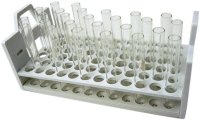 The addition of high-dose calcitriol to weekly treatment with the chemotherapy agent docetaxel (Taxotere(R)) appears to improve the therapeutic response in men with androgen-independent prostate cancer without compromising safety, according to results published Jan. 1 in the Journal of Clinical Oncology. Calcitriol is the active form of vitamin D.
The addition of high-dose calcitriol to weekly treatment with the chemotherapy agent docetaxel (Taxotere(R)) appears to improve the therapeutic response in men with androgen-independent prostate cancer without compromising safety, according to results published Jan. 1 in the Journal of Clinical Oncology. Calcitriol is the active form of vitamin D. Data from a phase II clinical trial suggest the combination of docetaxel/calcitriol is as much as twice as effective as the use of docetaxel alone, as measured by prostate-specific antigen (PSA) response rate. The results were so promising that a phase III trial has been launched at 15 sites throughout the United States.
"We're excited by these promising results, especially since there is no acceptable standard treatment for this type of prostate cancer," said Tomasz Beer, M.D., an oncologist at the Oregon Health & Science University (OHSU) Cancer Institute in Portland, Oregon, and lead investigator of the study.
In the study, 31 of 37 patients, or 81 percent, who were treated with the combination regimen cut their PSA levels by more than half. In fact, 59 percent of patients achieved a confirmed PSA reduction of greater than 75 percent. Studies of docetaxel alone have reported a 42 percent PSA response rate. PSA is a substance produced within the prostate gland, and a high PSA level may indicate the presence of cancer. In patients with advanced prostate cancer, PSA correlates with the amount of cancer in the body.
In addition to PSA response, eight of 15 men in the study with measurable disease responded with significant reductions of their tumors.
"Based on this data we've opened a much larger study nationwide that should tell us whether these preliminary findings continue to hold true in larger patient populations," said Beer.
Patients in the study received oral calcitriol on the first day of the treatment cycle, followed by an infusion of docetaxel the next day. The treatment was repeated weekly for six weeks of an eight-week cycle until there was evidence of disease progression or unacceptable toxicity, or until the patient requested to be withdrawn from the study. Calcitriol is not the same as over-the-counter vitamin D, which could be harmful if taken in large doses.